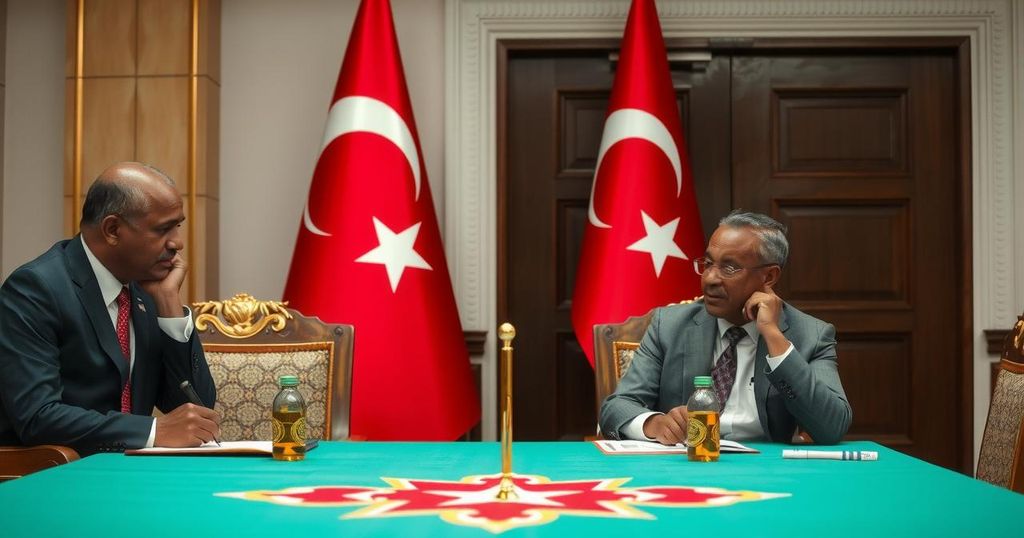Global news
AFRICA, AL-SHABAAB, DAWIT ENDESHAW, DIPLOMACY, DIPLOMATIC RELATIONS, EGYPT, ERITREA, FOREIGN MINISTRY, HASSAN SHEIKH MOHAMUD, MOGADISHU, MOHAMUD, NILE RIVER, REGIONAL COOPERATION, REGIONAL SECURITY, REUTERS, SOMALI NATIONAL NEWS AGENCY, SOMALIA, SONNA, THOMSON REUTERS, TU, TUVAN GUMRUKCU
Leila Ramsay
0 Comments
Somalia’s President Travels to Turkey for Critical Talks With Ethiopia
Somali President Hassan Sheikh Mohamud is on his way to Ankara for the third round of talks with Ethiopian Prime Minister Abiy Ahmed amidst rising tensions over Somaliland’s independence. This meeting is a crucial diplomatic effort aimed at stabilizing relations, influenced by Ethiopia’s military presence in Somalia and its plans regarding Somaliland. Close ties with Egypt and Eritrea further complicate this regional conflict, underscoring the importance of mediation.
The President of Somalia, Hassan Sheikh Mohamud, is traveling to Ankara, Turkey, to participate in the third round of negotiations aimed at reducing escalating tensions with Ethiopia, according to reports from the Somali National News Agency. This meeting marks a significant opportunity for the leaders of Somalia and Ethiopia to engage in dialogue for the first time since Ethiopia disclosed plans to construct a port in Somaliland, a move that has provoked strong objections from Mogadishu.
Ethiopia, which remains landlocked and maintains a military presence in Somalia to combat al Qaeda-affiliated groups, expressed intentions to formally recognize Somaliland’s independence, should a strategic land deal be reached. The negotiations are seen as crucial to regional stability as they occur against the backdrop of disputes over land and political recognition in the turbulent Horn of Africa region.
The Somali state news agency reported, “President (Mohamud) has departed for Ankara at the official invitation of President Recep Tayyip Erdogan. The third round of talks between Somalia and Ethiopia, mediated by Turkey, will resume.” Somaliland, which declared independence in 1991, has sought international recognition, though it has faced persistent opposition from the Somali central government.
Amidst this dispute, Somalia has sought closer ties with Egypt, which has its own longstanding tensions with Ethiopia over the Grand Ethiopian Renaissance Dam on the Nile River. Additionally, relations with Eritrea have also strengthened as a response to Ethiopia’s actions.
This diplomatic engagement led by Turkey signifies the critical role that international mediation plays in resolving conflicts in the region and the delicate balance of alliances in East Africa.
The tensions between Somalia and Ethiopia have deep roots, primarily revolving around Somaliland’s quest for recognition and Ethiopia’s plans to establish a port in the region. Somaliland, although self-governing and relatively peaceful, has been unable to achieve international recognition for its independence, while Mogadishu staunchly opposes this bid. With Ethiopia’s history of military involvement in Somalia and recent offers regarding independence recognition, the stakes in the ongoing negotiations are exceptionally high for regional stability and political dynamics. This situation unfolds within a broader context of East African geopolitics, particularly concerning water resources and territorial integrity.
In conclusion, the upcoming talks between President Hassan Sheikh Mohamud of Somalia and Ethiopia’s Prime Minister Abiy Ahmed represent a pivotal moment in regional diplomacy. The stakes are elevated due to the Somaliland independence conflicts and the strategic significance of the proposed port. As these leaders engage in dialogue, the outcome has the potential to reshape alliances and influence the political landscape in the Horn of Africa.
Original Source: www.usnews.com




Post Comment